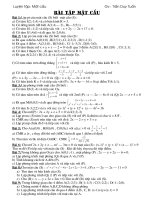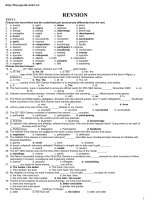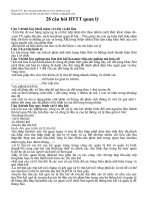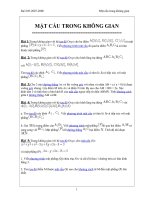Bài tập Tiếng Anh Viết lại câu ôn thi vào lớp 10
Bạn đang xem bản rút gọn của tài liệu. Xem và tải ngay bản đầy đủ của tài liệu tại đây (12.58 MB, 117 trang )
THUY DUONG Bigs
US
TỰHỌC
Boman
THI VAOLOP c9)
810 CHUYÊN
))Mego8OOK B
@DY) Ngan hang cau hoi
đa dạng, phong phú
gà Lời giải chỉ tiết nhắc lại
phương pháp và kiến thức
0 l VERB TENSES
hì của động từ)
ma 2
Task: Finish the second sentences so that it has similar meaning to the
first one, beginning with the given words. (Hoan thanh câu sao cho nghĩa
không đối, sử dụng từ cho sẵn đầu câu)
Past simple tense with 'used to”. (Quó khứ đơn với 'used to’)
1, When Barbara was in Italy, she stayed with an Italian family.
© Barbara used
2. Mert never smoked at all when he was at the university but now he smokes ten cigarettes
aday.
=> Mert didn’t
3. When | was a young girl, chocolate was one of my favorites.
=> Chocolate used
4, | don't like travelling by train now.
> lused
5. Mr. Michel grew tulips but he doesn’t any more.
= Mr. Michel used
6. | prefer listening to classical music now, although when | was young | couldn't stand it.
=> I didn't
7. | have just lost interest in my work.
=> lused
8. Dennis gave up playing football one year ago.
© Dennis used
9, There were many tree-lined streets in my hometown but now there is none of them.
> There used
10. Children didn’t play with high-tech devices at an early age but now they do.
> Children didn’t
Oca Bai tap vet a cau Tiéng Anh EN
Present perfect (continuous) tense and Past simple tense. (Hién tai
hoàn thành (tiếp diễn) và Quá khứ đơn)
1. Eight years ago, we started writing to each other.
=> We have
2. My father hasn’t smoked cigarettes for a month.
oltsa
3. Mr. Brown bought this car five years ago.
=> Mr. Brown has
4. | haven’t enjoyed myself so much for years.
=> It’s years
5. It's a long time since we last went to the cinema.
=> We haven't
6. He last had his eyes tested ten months ago.
= He hasn't
7. How long is it since he last wrote to you?
=> When ?
8. She hasn't had a swim since she graduated from university.
© She last.
9. Robert and Catherine have been married for ten years.
S It’s,
10. When did they start to learn Spanish?
= How long 1
3 Present perfect tense and comparison. (Hiện tại hoàn thành và câu so
sánh)
1, | have never read such a romantic story.
= This is
2. It is the most beautiful building that | have ever seen.
=> Ihave
3. You will never meet anyone more dangerous than Mrs. Jones.
= Mrs. Jones is
4. Man has never had such efficient servants as computer.
=> Computer.
5. This is the best film | have seen in my life.
9 Ive
mm. Bài tập viết lại câu Tiếng Anh E
6. Mr. Hung is the most intelligent person I’ve ever known,
= Ihave
7, This is the best music he has ever heard.
= He's
8, | have never seen a dirtier-lookidongg than this.
© This,
9. This is the most expensive dress she’s had.
= She
10. This is the fastest moving car I've ever driven.
> |have
Present perfect with adverbs of time. (Hién tai hodn thành với trạng từ
chỉ thời gian)
1, The last time she saw her elder sister was in 1999.
© She hasn't
2. This is the first time | have seen this film.
= | have never
3, She hasn't written to us since last year.
© The last time
4, This is the first time | have had such a delicious meal.
=> | haven't
5. The last time we went swimming was when we were in our hometown.
=> | haven't
6. This is the first time we've been to a night club.
>We
7. | haven't been to a concert for over a year. = — ==-.
© The last time
8. | haven't been to Taiwan for two years,
© The last time
9, | haven’t been to this place before.
S Itis
10. The last time | went camping was when | was in Hue.
© | haven't
Kết quả: mmm met
0 - 20: Ban cần ôn lại công thức viết lai câu và mối liên hệ giữa các thì nhiều hơn
nữa!
| 21-30: Bạn cịn mắc những lỗi sai sót nhỏ khi làm bài! Chỉ cần cố một chút nữa
| là thành công rồi!
i 31 ~ 40: Bạn làm rất tốt! Giữ vững phong dé trong cac bai tiép theo nhé! ©
2 Kiến thức cần nhớ:
Ban hay ghi lại những cơng thức cần nhớ sau khi hồn thành bài tập trên
Task: Write new sentences as similar as possible in meaning to the
original sentences, using the given words in brackets. Do not change
the given words in any way. (Viét Iai câu sao cho nghĩa không đổi, sử dụng
từ gợi ý trong ngoặc và không làm thay đổi dạng của từ)
n Comparative and equal comparison with adjectives. (So sánh hơn và
so sánh ngang bằng với tính từ)
1. Her old company is larger than her new one. (LARGE)
2
2. The black dress is more expensive than the red one. (CHEAPER)
2
3. According to me, English is more difficult than Literature. (LESS)
2
4. The Mekong river is longer than the Red river. (NOT)
>
5. Bill is not as tall as David. (SHORTER)
2
6. The film about my village is more interesting than the book. (NOT)
°
7. We are very busy at work today but we are not as busy as that every day. (BUSIER)
2
8. | thought the trip would be interesting, but it wasn’t. (BORING)
>
9. It is much more difficult to speak English than to speak French. (AS)
°
10. Ms. John is not so nice as Ms. Smith. (NICER)
2
BỊ Comparative and equal comparison with adverbs. (So sánh hơn và
so sóng ngang bằng với trạng từ)
1. They understand more than we do. (MUCH)
2
2. | can’t cook as well as my mother does. (BETTER)
°
3. Jane decorated the dish more beautifully than | did. (NOT)
2
4. Jim seems to care less about his health than he should. (MORE)
>
5. Today the Sun shines more brightly than yesterday. (AS)
>
6. | think a computer will be more helpful for you than a smartphone, (HELPFUL)
>
T. | am not an as good tennis player as Henry is. (BETTER)
2
8. He speaks more persuasively than his brother. (AN)
°
9. Non-smokers usually live longer than smokers. (NOT)
>
10. My sister writes more carefully than she did. (USED TO)
>
= Superlative sentences with adjectives and adverbs. (So sénh nhat vdi
tính từ và trạng từ)
1. This is the best film I’ve seen. (NEVER)
>
2. No one in my class is more intelligent than Lan. (MOST)
°
3. | have never met anyone more interesting than Mr. Hung. (THE)
2
a
~..4, No student in my class speaks English as fluently as Phuong does. (FLUENTLY)
°
5. This story is more boring than any other story that | have ever read. (THE)
>
6. Murder is the most serious of all crimes. (NO)
°
7. Mount Everest is the highest mountain in the world. (HIGHER)
°
8, Have you got any more expensive dress than this one? (EXPENSIVE)
°
9. No one in the company works more productively than he does, (MOST)
°
10. She can pronounce English words more correctly than anyone inour class. (THE)
°
I Comparison with ‘as ... as’, ‘the same (...) as’ and ‘different from...’
(So sánh hon véi ‘as ... as} ‘the same (...) as’ va ‘different from ...')
1, My T-shirt is not the same as yours bought yesterday. (DIFFERENT)
°
2. My mother and my aunt are the same weight. (HEAVY)
°
3. The white car is much cheaper than the black car. (PRICE)
2
4, This dining table and that one over there are the same size. (BIG)
>
5. My old school has a large yard but my new one doesn’t. (FROM)
>
6. Can Tho bridge is as long as Thang Long bridge. (LENGTH)
°
7. Phuc and Minh are the same height. (AS)
T_——— a
8. My daughter is ten years old, so is her daughter. (SAME)
°
9. Life in foreign countries is different from life in home country. (NOT)
>
10. This art museum is not the same as the historical museum. (DEFINITELY)
>
2
IE] Comparison with nouns. (So sánh với danh từ)
1. My class has 45 students but my brother”s class only have 36 students. (MORE)
>
2. My brother has more friends than my sister. (FEWER)
2
3. My father spends more time repairing household appliances than my mother. (MUCH)
2
4, My mother bought more food and drinks than her mother. (LESS)
2
5. Does a mango contain more sugar than an apple? (LESS)
2 2
6. | spend more time watching TV than my younger sister does. (LESS)
2
7. People in developed countries use more money on health care and education than
in underdeveloped countries. (DON’T)
2
8. Are there more health centres in my city now than ten years ago? (FEWER)
2 ?
9. There are more wealthy people in big cities than in the countryside. (FEWER)
>
10. The standards of living in the cities shows more improvements than in rural areas. (MUCH)
>
ee LL— Nhan
F | Double comparison with “The more..., the more... ° (So sánh kép với
"The more ..., the more ...)
1. Success depends on hard work. (HARDER)
°
2. My sister works better when she is pressed for time. (LESS)
>
3. His interest in the game increased with his proficiency. (MORE)
2
4. When you get near to the Equator, the temperature becomes high. (NEARER)
°
5. The value of a picture depends on how famous the artist is. (VALUABLE)
°
6. If you stay in Vietnam for a long time, your Vietnamese will be very good. (BETTER)
°
7. As the streets become busier, they will be more and more dangerous for commuters.
(MORE)
>
8. The development in the economy makes people’s living condition better. (MORE)
2
9. The children are excited with the difficult games. (EXCITED)
>
10. People accumulate a lot of things as they travel far. (FARTHER)
°
'59/889888I Bài tậpviết lại cầu Tiếng Anh
Kết quả:
| 0~ 30: Bạn cần ôn lại công thức viết lại câu, và các dạng so sánh!
| 31 - 45: Bạn cịn mắc những lỗi sai sót nhỏ khi làm bài! Chỉ cần cố một chút nữa
là thành công rồi!
| 46 - 60: Ban làm rất tốt! Giữ vững phong đô trong các bài tiếp theo nhé! ©
Kiến thức cần nhớ:
Bạn hãy ghi lại những cơng thức cần nhớ sau khi hồn thành bài tâp trên
PASSIVE VOICE
(Thức bị động)
== ) Task: Finish the second sentences so that it has similar meaning to the
first one, beginning with the given words. (Hodn thònh câu sao cho nghĩa
không đổi, sử dụng từ cho sẵn đầu câu)
ry Passive voice with verb tenses. (Cau bi động với các thì của động từ)
1. They didn’t allow Tom to take these books home.
= Tom wasn’t
2. Workers were digging a large hole in the ground.
= Alarge hole
3. What language do people speak in this country?
=> What language.
4. The examiner will read the passage 3 times.
=> The passage
5. 1am translating an article into Vietnamese.
= An article
6. This is the first time they have written to us about this.
© This is
7. Someone had invented electric lights before | was born.
© Electric lights
8. Has anyone ever asked you for your opinion?
= Have you
9. Is he going to look after the children when you cook meals?
© Are the children
10. By this time tomorrow, the president will have made the announcement.
© By this time tomorrow, R
Bài tập viết lại câu Tiếng Anh.
D} Passive voice with modal verbs. (Cau bi động với động từ khuyết thiếu)
1. Visitors must leave umbrellas in the cloakroom.
=> Umbrella
2. The children will be taken to the park by the teacher.
= The teacher ————————'
3. Passengers shouldn’t throw away their tickets as inspectors may check them during
the journey.
=> Passengers’ tickets
4. Members may keep books for3 weeks.
=> Books
5. You should open the wine about3 hours before you use it.
= The wine
6. When they have widened this street, the roar of the traffic will keep residents awake
all night.
=> When this street
7. They ought to have reported the accident to the police.
= The accident $
8. My sister must prepare breakfast before she goes to work every day.
= Breakfast
9. Nina shall call you as soon as she arrives.
= You
10. The report should be finished by Mark next week and he istrying to complete it.
= Mark
Fel passive voice with two objects. (Câu bị động với hai tân ngữ)
1. Their grandmother told them this story when they visited her last week.
=> They were
2. They asked me some questions at the interview.
=> |was
3. They hadn’t given me the information | needed.
©> The information | needed
i ae
4. Have you sent the Christmas cards to your family?
© Have the Christmas cards ?
5. They have given the women in most countries in the world the right to vote in election.
=> The women
6. She didn’t show me this special camera.
= |was not
7. Will Amy's company give her some money when she retires?
= will 7
8. The board awarded the first prize to the reporter.
© The first prize
9. She bought some cups of tea to the visitors in the next room.
= Some cups of tea
10. Have they provided the victims with food and clothing since the storm last month.
= Have food and clothing ?
Passive voice with ‘to V’ and *V-ing" (Câu bị động với ‘to V' và ‘V-ing’)
1, She admitted stealing my car last week.
© My car.
2. They avoided meeting me because they didn’t like me.
SI
3. There were nine students in the hall. The teacher told them to keep silent during the
time.
= Nine students
4. | used to take him to the city when he wasa little boy.
9 He
5. | hate people laughing at me.
>
6.1 don’t enjoy them making me do the work.
=Idont
7. They expected me to meet them at the airport.
=> They
8. She offered to give me a chance to be a teacher at the school.
>I
9. Your house will look very beautiful once you have finished decorating it with bright
pictures.
= Your house
10. When | was 10 years old, my father didn’t allow me to go fishing with my friends.
= Mary asked us
E) Passive voice with verbs of perception. (Câu bị động với động từ chỉ
nhận thức)
1. | have heard her sing this song several times.
= She has
2. Some people saw him steal your car.
= Your car
3. The detective saw the woman putttheijneweglry in her bag.
=> The woman
4. They notice you climbing over the window.
=> They
5. People saw that man rush out of the bank after the robbery.
= That man
6. | see him bath his dog now.
> He
7. They have looked the children skipping in the school yard several times.
=> The children
8. We notice Nam cooking the lunch for his wife with a lot of happiness on his face.
=> Nam
9. We watched two men running across the garden and climbing through an open win-
dow into the house.
=> Two men
10. When | walked into the house, | noticed my sister reading a small note.
=> When!
F] Passive voice with reporting verbs. (Câu bị động với động từ tường thuật)
1, People believe that he was killed by terrorists.
=> He
2. We knew that you were in town on thenight of the crime.
= You
3. It is reported that many people are homeless after the floods.
= Many people
4, People think that Tom stole food in the supermarket 3 days ago.
®ltis
5, People considered that she was the best sitnhatgAue strr alian has ever produced all
the time,
= She
6. It is expected that the weather will be good tomorrow.
= People
7. Itis found that she drove through the town at 50 miles an hour.
=> She
8. It is reported that several Japanese manufactures are planning to set up plants
overseas.
= Several Japanese manufactures.
9, They rumoured that the man was still livinign London.
Sit
10. People say that Jack London’s life and writings represent the American love of
adventure.
© Jack London's life and writings
Passive voice with causative form. (Cau bi động thể sai khiến)
1. | have my brother repair my computer for me.
=> Ihave
2. We are going to get our water pipe fixed by the plumber.
= Weare going to
3. | have had Peter wash my car already.
= Ihave
4, She had a porter carry her luggage when she arrived at the airport yesterday.
= She had
5. Could you please get John to take us to Lan’s house tomorrow afternoon?
= Could you
6.1 never get my clothes washed by my father.
® Inever
7. Minh has just got his neighbor to post a letter for him because he has a broken leg.
= Minh has
8. It's about time you had somebody whitewash your house.
= It's about time
9. The villagers have got the use of washing machine explained by this engineer.
= The villagers ——————————.
10. The government has had new houses built in the rural areas.
=> The government ———————:
Ỹ
t HH Other cases. (Cac trudng hợp khóc)
1. Itis difficult for me to finish this test in one hour.
= Itis
2. Itis necessary to complete the work.
=> The work
3. It is common knowledge that Joe has been in prison several times.
© Joe is known
4. Nobody has used this room for ages.
= This room
5. Don’t ask for another book until you finish this one.
= You are
6. Remember to check your telephone number.
> Your
7. Are you interested in the film you saw last night?
® Are you.
8. It’s your duty to check all the documents before the meeting starts.
® All the documents
9. It’s no use asking them to stay at home. They can’t help joininthge party.
=> Something
10. The tea was so hot that no one would drink it.
=> The tea
eS Bài tập viếtlại câu Tiếng Anh
Ngay: isc Vacca Điểm đạt được: " +
_ Kết quả:
0 - 40: Bạn cần ôn lại công thức viết lại câu và cách biến đổi các thành phần
| trong câu!
' 41-60: Bạn còn mắc những lỗi sai sót nhỏ khi làm bài! Chỉ cần cố một chút nữa
là thành công rồi!
. 61 ~ 80: Bạn làm rất tốt! Giữ vững phong độ trong các bài tiếp theo nhé! ©
Kiến thức cần nhớ: ®
Ban hãy ghi lai những cơng thức cần nhớ sau khi hoàn thành bài tập trên
REPORTED SPEECH
(Lời nói gián tiếp)
peer -^ ˆ —
Task: Finish the second sentences so that it has similar meaning to
the first one, beginning with the given words. (Hoàn thành câu sao
cho nghĩa không đổi, sử dụng từ cho sẵn đầu câu)
nq Reported statement with verb tenses. (Câu gión tiếp với thì của động từ)
1. “| have been working here for five years.” she said.
© She said that
2. “We don’t want to discuss this matter again.” they said.
=> They said that
3. “I didn’t study hard, so | failed the exam years ago.” he said to me.
= He told me
4. “The secretary hasn't finished typing the letter yet.” he said.
=> He said that
5. “We were walking when we saw the terrible accident.” they said.
= They said that
6. “lam helping my father paint this wall right now.” he said to us.
> He told us
7. “She is the most intelligent woman | have ever met.” he said.
© He said that
8. “The flight to Canada was cancelled yesterday evening.” he said to me.
> He told me
9. “I'm going to start my own photography business next month, so now | need your
help.” he said.
=> He said that
10. Susan said “You don’t know what Bob is doing”.
=> Susan said that
Bai tap viết lại câu Tiếng Anh
IBÌ Reported statement with modal verbs. (Câu gión tiếp với động từ khuyết
thiếu)
1. “You must report the accident to the policeman.” she said to me.
> She told me that
2. “You should read this magazine yesterday.” he said to her.
=> He told her that
3. My parents said, “We'll phone you when we get back”,
=> Myparentssaidthat __________số
4. “Your English can be improved very quickly because you are working so hard this
semester.” Peter said.
© Peter told me that .
5. “We can't manage our business successfully without her father’s money.” the couple said.
=> The couple said that Seee eee a )
6. “We won't leave until we see the manager.” said the customers.
= The customer said that š
T. “I wilLarrive before my brother comes to the airport.” Peter told her.
=> Peter told her
8. “I can’t go to your birthday party next Saturday evening, Jack”, said Mary.
=> Mary told Jack
9, “My biggest aunt may drop by and have dinner at my home tomorrow.” she said.
© She said that
10. The teacher said, “We can collect old books for the poor students in our area.”
=> The teacher told that ‘
Reported speech with Yes/ No questions. (Câu gián tiếp với câu hỏi
dang tra Idi Yes/No)
1. “Were you reading this book at 8 o’clock last Sunday evening?” she asked Ba.
= She asked Ba if
2. “Will it be dangerous to stand here?” they asked me.
© They asked me if
3. “Does it take you much time to draw this picture?” he asked her.
=> He asked her
Bài tập viết lại câu Tiếng Anh









